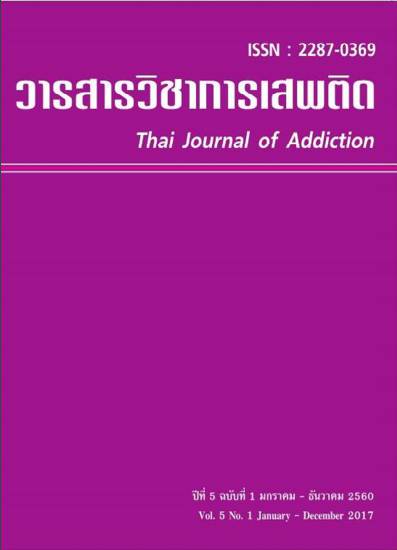Cognitive Behavioral Therapy Program in Alcohol Harmful use disorder and Alcohol dependence: 50 Punsa Mahavajiralongkorn Hospital, Ubon Ratchathani Province.
Keywords:
Alcohol Harmful use and Alcohol Dependence, alcohol withdrawal, Cognitive Behavioural TherapyAbstract
The Objective aimed to the effectiveness of Cognitive Behavioral Therapy; CBT for the alcohol harmful use disorder and dependence; after-effects and post care alcohol withdrawal in the 50 Pansa Maha Vajiralongkorn hospital, Ubon Ratchathani province.
Methodology: Quasi-experimental research. The study population consisted of outpatients who had problems or effects of alcohol use and inpatients who had after-effects and post care alcohol withdrawal, evaluated by AWS <5. The Inpatients were admitted to the hospital in the 50 Pansa Maha Vajiralongkorn Hospital, in the fiscal year 2557-2559. The 429 samples of alcoholics aged 18 years and over were diagnosed with primary alcohol or dangerous drink. AUDIT Alcohol: Harmful use 16 -19 scores. Dependence score >20 scores and who have voluntary acceptance for one treatment session per week, total 8 times. Tools used include Cognitive and Behavioral Therapy (CBT) program developed from Osilla's cognitive and behavioral therapy. All 8 sessions highlight the fine thoughts and behaviors to reduce or stop drinking alcohol and study the results after one-year follow up. The descriptive statistics: frequency and percentage. The inferential statistics: Chi-square statistics were used to test the difference in the outcome of reduce or stop drinking alcohol of inpatient versus outpatient. The Odds ratio, the correlation of reducing or stopping alcohol consumption among inpatients per outpatients.
Result:
- The results of alcohol treatment with CBT showed that stop drinking alcohol was 20.3%, alcohol reduced by 52.9% and continued to drink alcohol by 26.8%.
- Analyze the results of the treatment for the years 2014-2016, outpatients were found that 20.2%, 17.9% and 13.1% stop drinking alcohol, and 27.4%, 57.1%, and 63.1% reduce drinking alcohol respectively. Inpatients were found that 48.2%, 24.2% and 27.9% stop drinking alcohol, 40.7%, 63.6%, and 60.5% reduce alcohol respectively.
- Comparison of treatment outcomes in the two groups showed that the inpatients were significantly likely to reduce or stop drinking alcohol more than the outpatients (P-value <0.001), and inpatients were more likely to reduce or stop drinking alcohol than outpatients, 3,503 (95% CI of OR = 1.837 - 6.680). But by the same picture, the two groups behaved better than before, not to increase drinking to the amount of health hazards. Finally, the samples were satisfied with good or very good healing more than 85 percent.
Conclusion and Recommendation: Cognitive Behavioral Therapy useful in nursing practice. That makes alcoholic patients reduce or stop drinking in long term study.
References
2. Boden, J. M., & Fergusson, D. M. Alcohol and depression. Addiction. May, 2011; 106(5): 906–914.
3. Tiet, Q.Q., & Mausbach B. Treatments for patients with dual diagnosis: a review. Alcoholism: Clinical and Experimental Research. 2007; 31(4): 513–536.
4. Beck, J. S., Liese, B. S., & Najavits, L.M. Cognitive therapy. Clinical textbook of addictive disorders (3rd ed.). New York: Guilford Press. 2005.
5. เพ็ญพักตร์ ดารากร. ความสำเร็จในการเลิกสุราของผู้ป่วยสุราที่มีโรคร่วมทางจิตเวช. วารสารการพยาบาลและสุขภาพจิต. 2556; 27(1): 1-15.
6. Osilla, K.C., et al. Developing an integrated treatment for substance use and depression using cognitive–behavioral therapy. Journal of Substance Abuse Treatment. 2009; 37(4): 412 – 420.
7. Baker, A.L., et al. Randomized controlled trial of MICBT for co-existing alcohol misuse and depression: Outcomes to 36-months. Addiction. 2013; 46(3): 281-402.
8. Hunter, et al. Treating depression and substance use: A randomized controlled trial. Journal of Substance Abuse Treatment. 2012; 43(2): 137–151.
9. Liese, B. S. Cognitive-Behavioral Therapy for Addictions. Clinical work with substance abusing clients (3rd ed.). New York: Guilford Press; 2014.
10. Lisa, J.,& Mark A.B. CMO Alcohol Guidelines Review.CPH Center for public health; 2014.
11. ชนกฤทัย ชื่นอารมณ์. การบำบัดแบบปรับเปลี่ยนความคิดและพฤติกรรมสำหรับผู้ติดสารเสพติด.
คณะพยาบาลศาสตร์ มหาวิทยาลัยขอนแก่น; 2554.
12. ดรุณี ภู่ขาวและคณะ. การบำบัดผู้ติดสุราและสารเสพติดด้วยการปรับเปลี่ยนความคิดและ พฤติกรรม. เชียงใหม่: แผนงานวิชาการและสารเสพติดชุมชน กรมสุขภาพจิต กระทรวงสาธารณสุข; 2555.
13.แผนงานการพัฒนาระบบการดูแลผู้มีปัญหาการดื่มสุรา. คู่มือการดูแลผู้ที่มีปัญหาการดื่มสุราเบื้องต้นสำหรับบุคลากรสุขภาพ. วนิดาการพิมพ์; 2557.
14. กรมสุขภาพจิตรายงานประจำปี. การพัฒนาคุณภาพมาตรฐานการบริการสุขภาพจิตและจิตเวข.
กรมสุขภาพจิต; 2560.



